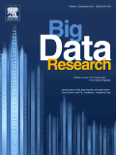
Data
Scope & Guideline
Unlocking insights through open-access data exploration.
Introduction
Aims and Scopes
- Data Collection and Sharing:
The journal focuses on the systematic collection and sharing of diverse datasets, including but not limited to, environmental data, genomic sequences, and social media analytics. This promotes transparency and replicability in research. - Methodological Innovation:
It emphasizes the development and application of innovative methodologies for data analysis, including machine learning, statistical modeling, and data mining techniques, thereby enhancing the analytical capabilities of researchers. - Interdisciplinary Applications:
The journal covers interdisciplinary research applications, showcasing datasets that span multiple fields such as biology, environmental science, social science, and engineering, thereby broadening the impact of data-driven research. - Open Data and Accessibility:
Promoting open data principles, the journal encourages the publication of datasets that are accessible to the research community and the public, facilitating collaborative research and knowledge exchange. - Data Quality and Standards:
It addresses issues related to data quality, standardization, and validation, ensuring that published datasets meet rigorous scientific standards and can be reliably used by researchers.
Trending and Emerging
- Machine Learning and Artificial Intelligence:
There is a significant increase in datasets and studies utilizing machine learning and artificial intelligence techniques. This trend highlights the growing importance of these technologies in data analysis and predictive modeling across various domains. - Environmental and Climate Data:
Research related to environmental and climate data is on the rise, reflecting global concerns about climate change and the need for data-driven solutions to environmental challenges. - Health Data and Bioinformatics:
The journal is seeing a surge in health-related datasets, particularly those related to genomics, public health, and the impacts of diseases such as COVID-19, showcasing the critical role of data in health research. - Multimodal Datasets:
There is an emerging focus on multimodal datasets that integrate various types of data (e.g., audio, visual, and text), reflecting the complexity of real-world problems and the need for comprehensive analytical approaches. - Data Privacy and Ethics:
As data usage expands, there is a growing emphasis on datasets that address data privacy and ethical considerations, particularly in sensitive areas like health and social media.
Declining or Waning
- Traditional Statistical Analysis:
There has been a noticeable decrease in papers solely focused on conventional statistical methods without incorporating modern data analytics techniques. This shift suggests a growing preference for advanced methodologies like machine learning and artificial intelligence. - Small Scale Local Datasets:
Research centered around small-scale or localized datasets is becoming less frequent, possibly due to the increasing emphasis on large-scale, global datasets that can provide broader insights and applicability. - Descriptive Studies:
There is a waning interest in purely descriptive studies that do not leverage advanced analytical techniques. Researchers are increasingly expected to provide predictive or inferential insights from their data. - Single-Discipline Focus:
The journal has seen a decline in datasets that focus exclusively on a single discipline, as interdisciplinary approaches are gaining more traction, reflecting the need for comprehensive understanding across various fields.
Similar Journals

Data Intelligence
Fostering Collaboration in the World of Data ScienceData Intelligence, published by MIT PRESS, is an influential open-access journal dedicated to advancing knowledge within the intersecting fields of Artificial Intelligence, Computer Science Applications, and Information Systems. Since its inception in 2019, it has rapidly established itself as a leading academic platform, achieving impressive rankings—including Q2 in its principal categories for 2023—demonstrating its impact and relevance in these dynamic fields. With an E-ISSN of 2641-435X, Data Intelligence aims to bridge theoretical research and practical applications, providing a venue for scholars and practitioners to disseminate innovative research and ideas. The journal's commitment to open access ensures that cutting-edge research is accessible to a broad audience, fostering collaboration and knowledge sharing among the global community of researchers, professionals, and students. Located in Cambridge, MA, Data Intelligence continues to pave the way for transformative insights in the realm of data-driven technologies through its rigorous peer-reviewed content and a wide array of interdisciplinary perspectives.

Acta Informatica Pragensia
Innovating Together: Uniting Ideas in Technology and Management.Acta Informatica Pragensia is a prominent open access journal published by UNIV ECONOMICS, PRAGUE, which has been dedicated to advancing the fields of Computer Science Applications, Information Systems, Library and Information Sciences, and Management Information Systems since its inception in 2012. Situated in the beautiful Czech Republic, this journal aims to foster academic dialogue and disseminate high-quality research across these interdisciplinary domains. With an H-index indicating its growing impact, Acta Informatica Pragensia offers authors the opportunity to publish their findings in a Q4 ranked journal within significant categories according to the 2023 metrics, including a notable Q3 in Library and Information Sciences. Its placement in the Scopus ranks also showcases its relevance in the field, including a solid position in the 58th percentile for Library and Information Sciences. The journal's open access model ensures that research is widely available, empowering students, researchers, and professionals to engage with the latest innovations and trends. Submissions from diverse backgrounds are welcomed, making it an essential resource for those seeking to contribute to the evolution of information technology and systems.

Earth System Science Data
Connecting Data and Discovery in Earth SciencesEarth System Science Data, published by COPERNICUS GESELLSCHAFT MBH, is a premier open access journal dedicated to advancing the field of Earth and planetary sciences. With an impressive impact factor, it holds a distinguished Q1 ranking in the Earth and Planetary Sciences category, underscoring its significance within the scientific community. Established in 2009, the journal has been committed to providing a platform for the dissemination of high-quality, freely accessible research data that supports the understanding and management of Earth's complex systems. The journal welcomes contributions that offer extensive datasets, innovative methodologies, and collaborations that push the frontiers of Earth sciences, making it an essential resource for researchers, professionals, and students alike. Based in Göttingen, Germany, Earth System Science Data remains a vital asset for those seeking to engage with and contribute to impactful scientific discourse across the globe.

Scientific Data
Pioneering Open Access for Global Research ImpactScientific Data, published by NATURE PORTFOLIO, is a premier open-access journal that has been providing researchers with a platform to share high-quality data across various interdisciplinary fields since 2014. With its E-ISSN 2052-4463, the journal has established itself in the United Kingdom and gained global recognition. As of 2023, it has achieved remarkable quartile rankings, being placed in Q1 across several categories including Computer Science Applications, Education, Information Systems, Library and Information Sciences, and Statistics and Probability. These rankings highlight its pivotal role in advancing data sharing and methodologies, which are critical to fostering innovation and collaboration in research. The journal’s strong Scopus rankings, with top positions in Mathematics, Decision Sciences, and Social Sciences reinforce its importance as a key resource for academics, professionals, and students seeking to utilize and contribute to the rich ecosystem of scientific data. With open access options, Scientific Data empowers a diverse audience to engage with the latest research findings and datasets, ensuring that invaluable insights are accessible to all.

Journal of Advances in Information Technology
Empowering Innovation in Information TechnologyJournal of Advances in Information Technology, published by ENGINEERING & TECHNOLOGY PUBLISHING, is an essential platform for researchers, professionals, and students invested in the dynamic fields of information technology, artificial intelligence, and computer science. With its ISNN of 1798-2340, this journal provides a rigorous peer-reviewed environment that supports the dissemination of innovative research findings, methodologies, and case studies. Since its inception in 2019, it has made notable strides, as reflected in its Q3 quartile rankings across various categories, including Artificial Intelligence and Software, and maintains respectable Scopus rankings, further solidifying its position as a key player in the academic community. Featuring a diverse range of topics within its scope, the journal encourages open access to knowledge while serving as a beacon for those seeking to expand their understanding of current trends and technologies shaping the future. Join us in advancing the field with impactful research that is both relevant and cutting-edge.

GEOINFORMATICA
Pioneering Methodologies for a Spatially Aware WorldGEOINFORMATICA is a leading journal in the field of geoinformatics, widely recognized for its contributions to both Geography, Planning and Development as well as Information Systems. Published by Springer, this journal holds a distinguished Q1 ranking in Geography and a Q2 ranking in Information Systems as of 2023, reflecting its high-impact research contributions and authoritative voice in these disciplines. Since its inception in 1997, GEOINFORMATICA has provided a platform for innovative research, methodologies, and applications related to geographic information science, spatial data analysis, and remote sensing technologies. The journal's rigorous peer-review process and strategic positioning within the academic landscape allow it to attract a diverse array of publications, assisting researchers, professionals, and students in understanding complex spatial phenomena. While the journal does not offer Open Access, it remains a vital resource located in the Netherlands, and its indexed status has secured impressive Scopus rankings—#131 in Geography, Planning and Development, and #134 in Information Systems, showcasing its robust scholarly influence. Explore the latest developments and cutting-edge research through GEOINFORMATICA, where scholarly excellence converges with real-world relevance.

Big Data and Cognitive Computing
Advancing Knowledge in Data-Driven Technologies.Big Data and Cognitive Computing is a premier open-access journal published by MDPI, dedicated to advancing research in the dynamic fields of artificial intelligence, computer science, information systems, and management information systems. Since its inception in 2017, the journal has established a significant presence, reflected in its impressive categorization within the Q2 quartiles for multiple disciplines in the 2023 rankings. Situated in Switzerland, the journal provides a vital platform for researchers, professionals, and students to publish groundbreaking work and access high-quality articles, enhancing the exploration of big data applications powered by cognitive computing. With an increasing global emphasis on data-driven decision-making, Big Data and Cognitive Computing offers unrestricted access to innovative research findings, addressing both theoretical and practical aspects. The journal's contributions are integral for those looking to stay at the forefront of technological advancements and their implications across various sectors.

Big Data Research
Unlocking the potential of big data.Big Data Research, published by Elsevier, is a leading academic journal dedicated to the exploration and advancement of Big Data methodologies and technologies. With an ISSN of 2214-5796, and a commendable impact reflected in its Scopus rankings—ranking Q2 in Computer Science Applications and Q1 in Information Systems—this journal offers a prominent platform for researchers and practitioners to share innovative findings in the realm of data science, analytics, and management. Since its inception in 2014, Big Data Research has fostered a multidisciplinary approach, addressing cutting-edge topics crucial for both academic inquiry and real-world applications. The journal's objectives include advancing the understanding of data-intensive systems, promoting essential methodologies for big data analytics, and enhancing data-driven decision-making processes across various industries. As an open access journal, Big Data Research is committed to disseminating knowledge widely, allowing researchers, professionals, and students to stay at the forefront of developments in this fast-evolving field. Its influence in the academic community is further underscored by a strong commitment to quality and relevance, making it an essential resource for anyone interested in the transformative power of big data.

SoftwareX
Bridging Knowledge Gaps in Software ApplicationsSoftwareX is an innovative open-access journal published by Elsevier that has been championing advancements in the fields of Computer Science and Software since its inception in 2015. With a focus on presenting high-quality research, SoftwareX aims to foster collaboration and knowledge exchange among researchers and practitioners, advancing the way software and tools are developed and disseminated within the community. This journal operates under a flexible access model, allowing broad visibility and accessibility to its diverse readership. Positioned in the Q2 and Q3 quartiles of the Scopus ranking system within the domains of Computer Science Applications and Software respectively, SoftwareX stands as an influential platform for sharing cutting-edge methodologies and innovations. The journal's aim is not only to serve as a repository of knowledge but also to embolden practitioners and scholars alike to engage with and implement findings that can accelerate progress within the realms of software engineering and application. Situated in Amsterdam, Netherlands, SoftwareX has embraced an international reach, welcoming submissions that address complex challenges through novel software solutions.

Data in Brief
Bridging Disciplines with Essential Data Discoveries.Data in Brief is an esteemed open-access journal published by Elsevier that has been at the forefront of disseminating valuable and succinct research findings since its inception in 2014. With a focus on multidisciplinary and educational data, the journal serves as a vital platform for researchers, professionals, and students seeking quick access to high-quality data papers that complement larger research articles. Notably, Data in Brief holds a commendable rank of #40 out of 171 in the multidisciplinary category, placing it in the 76th percentile, which underscores its relevance and impact within the academic community. Operating with an open-access model, it ensures that research is readily available to a global audience, facilitating collaboration and innovation across various fields. The journal's commitment to providing a rich repository of easily digestible data makes it an essential resource for anyone interested in enhancing their research or knowledge base.